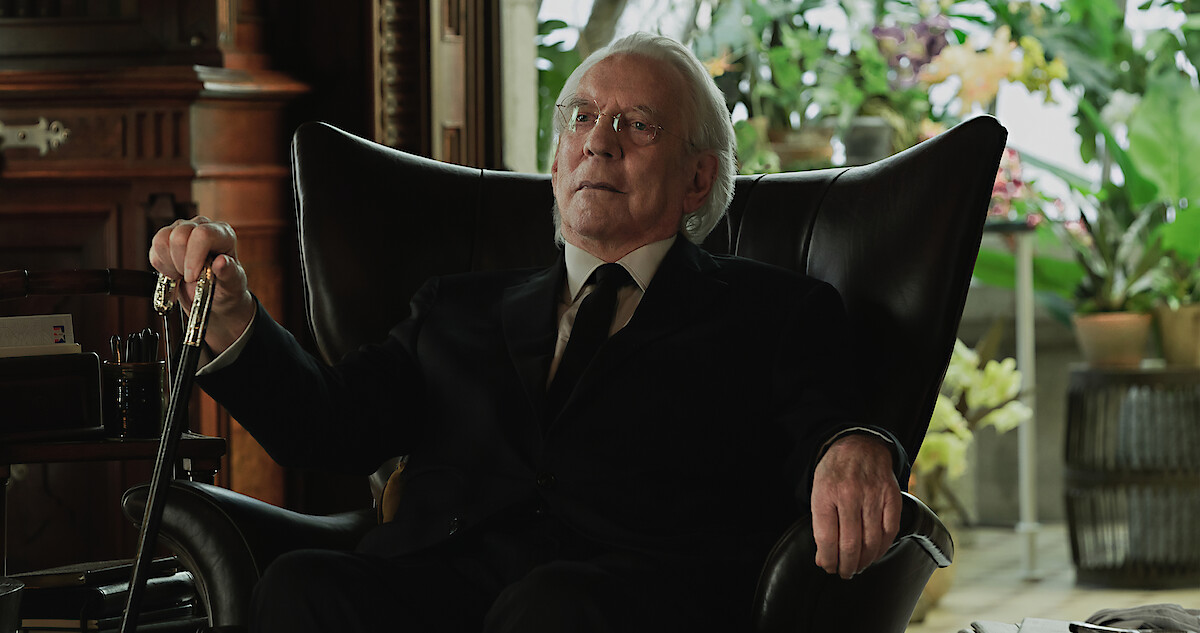
Credit: Mr. Harrigan’s Phone
There’s actually a bit to unpack with this movie since despite looking a little boring and kind of quiet, this story does have a lot more to it than people might initially think. The main character, Craig, is a nice enough kid, but with the loss of his mother, his father is less than affectionate but appears to still be a good father who is simply caught up in his grief. There’s no abuse or outright neglect, as Craig is well-cared for, and he in turn feels guilty for his mother’s death, though he had no control over it. But when an introverted billionaire, Mr. Harrigan, played by Donald Sutherland, hears Craig reading in church, he offers to pay Craig if he will read to him three times a week. It’s an odd request to be certain, but it does turn out to be innocent enough as it would appear that Mr. Harrigan simply wants to spend time with someone that will accommodate his need to hear the written word spoken aloud. Over time, he and Craig become friends, and when Craig is gifted an iPhone for Christmas, and a lottery scratcher from Mr. Harrigan, he ends up winning $3,000 and, in an act of charity, decides to buy Mr. Harrigan his own iPhone. One could have easily expected the old man to say no to such a gadget initially, as Harrigan presents himself as an old-school thinker without any need for such a device. But when Craig shows him the overall usefulness of the phone, it begins to make sense to the old man.
The fact that cell phones are habit-forming is illustrated quite well.
Cell phones are used as a status symbol when Craig reaches high school, and a distraction when it comes to Mr. Harrigan, who is actually caught fiddling around on his phone while Craig is reading to him at one point. This does reinforce the argument that people are in fact connected too strongly to their phones, and as a result, our phones have taken over a considerable amount of our lives. The act of placing Mr. Harrigan’s phone in his pocket before being buried feels almost like a sin on the part of Craig, but an unwitting one at best, since the gesture wasn’t meant to harm. However, the fact is that it would appear that Mr. Harrigan had attuned himself to his phone in such a way that his spirit would not be allowed to rest so long as he still had a connection to his young friend. That’s one way to look at it least, and severing the connection would mean that Mr. Harrigan could finally rest and that Craig would finally learn what it meant to let go. Plus, the fact that Craig stands at the table in his high school, where screen time is more important than open discussion, forms a massive statement that many people have tried to make in this technological age.
Mr. Harrigan almost comes off as sinister, but to be fair, he’s simply a lonely old man.
Having a closet filled with secrets doesn’t exactly make a person look like someone that’s trustworthy, but in the end, it was discovered that Mr. Harrigan’s secrets were no more sinister than Craig’s, as he lost his mother at a young age as well, and could not let go of the memories of her that he sought to keep. Mr. Harrigan did come off as a little creepy at times, but the fact that he was such a massive introvert explained away a great deal of this feeling, not to mention that it made him a much more sympathetic character who had likely seen and done things in his past that he might regret, but nothing so damning as to place him in danger of moving on to eternal torment. These days, too many people appear to feel that old individuals who ask for something from the younger generations are doing so because of some sick, twisted reason that must be avoided at all costs. But this assumption not only robs the elderly of their usefulness and charm, it creates a danger where there is none since it feels fair to say that a lot of people might have taken a look at Mr. Harrigan and thought that he was some creepy old man when in truth he is an old man, but he also appears to be someone with extremely antisocial tendencies that simply can’t find ways to connect with many people.

credit: Mr. Harrigan’s Phone
If there’s any villain in this story, it’s Craig, but even that isn’t entirely accurate.
I say this loosely because it is Craig who allows his emotions to get the best of him when it comes to those that he eventually condemns to death, such as Kenny and Deane. In his defense, Craig had no true idea of how far Kenny would go when it came to punishing him for a crime he did not commit. Kenny’s poor decisions were of his own making and his life had taken a bad turn because of someone else’s decision to rat him out. Unfortunately, since Craig had stood up to him initially, Kenny believed it to be Craig who had ruined his life. As for Deane, some might say the crime fit the punishment, as the car accident that killed Craig’s favorite teacher, Ms. Hart, and injured her fiance was Deane’s fault. But it’s easy to state that there would be a heated debate over whether causing the man to commit suicide via the ghost of Mr. Harrigan was just or not.
In the end, letting go was the best option for everyone.
Allowing Mr. Harrigan to rest and learning to let go were lessons that Craig had to learn, and forgiving himself for events that were out of his control was also important. All in all, this was a rather interesting movie.
learning to let go
 Follow Us
Follow Us




